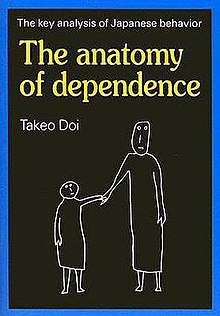The Anatomy of Dependence

Hardcover edition
|
|
| Author | Takeo Doi |
|---|---|
| Original title | 甘えの構造 |
| Translator | John Bester |
| Country | Japan |
| Language | Japanese |
| Subject | Dependence, Japanese national characteristics, amae |
| Publisher | Kodansha International |
|
Publication date
|
1971 |
|
Published in English
|
1973 |
| Pages | 170 pp. |
| ISBN | |
| OCLC | 756181 |
| 150/.19/5 | |
| LC Class | BF575.D34 D6413 |
The Anatomy of Dependence (甘えの構造 Amae no Kōzō) is a non-fiction book written by Japanese psychoanalyst Takeo Doi, discussing at length Doi's concept of amae, which he describes as a uniquely Japanese need to be in good favor with, and be able to depend on, the people around oneself. He likens this to behaving childishly in the assumption that parents will indulge you (Doi 2001:16), and claims that the ideal relationship is that of the parent-child, and all other relationships should strive for this degree of closeness (Doi 2001:39).
Amae (甘え) is the nominal form of the verb amaeru, which Doi uses to describe the behavior of a person attempting to induce an authority figure, such as a parent, spouse, teacher, or supervisor, to take care of him. The word is rarely used of oneself, but rather is applied descriptively to the behavior of other people. The person who is carrying out amae may beg or plead, or alternatively act selfishly while secure in the knowledge that the caregiver will indulge him. The behavior of children towards their parents is perhaps the most common example of amae, but Doi argued that child-rearing practices in the Western world seek to stop this kind of dependence, whereas in Japan it persists into adulthood in all kinds of social relationships.
Doi developed this idea to explain and describe many kinds of Japanese behavior. However, Doi states that while amae is not just a Japanese phenomenon, the Japanese are the only people known to have an extensive vocabulary for describing it. The reason for this is that amae is a major factor in Japanese interaction and customs. Doi argues that nonverbal empathic guesswork (sasshi 察し), a fondness for unanimous agreement in decision-making, the ambiguity and hesitation of self-expression (enryo 遠慮), and the tatemae–honne dynamics are communicative manifestations of the amae psychology of Japanese people.
Doi translates amaeru as "to depend and presume upon another's benevolence". It indicates, for Doi, "helplessness and the desire to be loved". Amaeru can also be defined as "to wish to be loved", and denotes dependency needs. Amae is, in essence, a request for indulgence of one's perceived needs.
Doi says,
"The psychological prototype of 'amae' lies in the psychology of the infant in its relationship to its mother; not a newborn infant, but an infant who has already realised that its mother exists independently of itself ... [A]s its mind develops it gradually realises that itself and its mother are independent existences, and comes to feel the mother as something indispensable to itself, it is the craving for close contact thus developed that constitutes, one might say, amae."
...
Wikipedia
